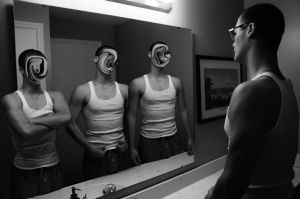4.1 Chapter Overview and Learning Objectives
4.1.1 Learning Objectives
- Interpret the sociological concept of reality as a social construct.
- Apply the different micro sociological theories to a variety of scenarios.
- Explain how individuals present themselves and perceive themselves in a social context.
- Differentiate psychological and sociological theories of self-development.
- Outline how sociologists approach emotions.
- Describe the importance of socialization both for individuals and society.
- Explain the nature versus nurture debate and sociology’s position within it.
- Distinguish between the agents and target of socialization.
- Explain how socialization occurs and recurs throughout life.

In all people I see myself, none more and not one a barley-corn less,
And the good or bad I say of myself I say of them.
– “Song of Myself, 20” by Walt WhitmanDo I contradict myself?
Very well then I contradict myself,
(I am large, I contain multitudes.)
– “Song of Myself, 51” by Walt Whitman
Do we contain multitudes? What are these poems saying about the human experience in general? Do we appear differently to different people as the opening image suggests (figure 4.1)? In this chapter, we explore the different identities and selves we may contain. Think about how you define yourself. What would you put down if you had to answer the question, “Who am I?”
Would you include your family? Friendships? Groups you belong to? Your race? Nationality? Ethnicity? Gender? Sex? Sexuality? Class? Some of these identities might be close to defining who we are, other aspects of our identity might be less relevant. While we are complex, there is some coherence to us. How can we explain these selves and identities sociologically?
In this chapter, we begin by addressing how we socially construct our worlds. We will then explore different theories that explain how we develop selves and identities. After that, we will discuss the social construction of emotions and end with a discussion of socialization. This chapter aims to give insight into how our social and group memberships influence who we are and how we understand the world around us.
4.1.2 Licenses and Attributions for Overview
“Overview” by Matthew Gougherty is licensed under CC BY-SA 4.0.
Excerpts from “Song of Myself, 20” and “Song of Myself, 51” by Walt Whitman are in the public domain.
Figure 4.1. Image by NCSU16, licensed under CC BY-SA 3.0, via Wikimedia Commons.
